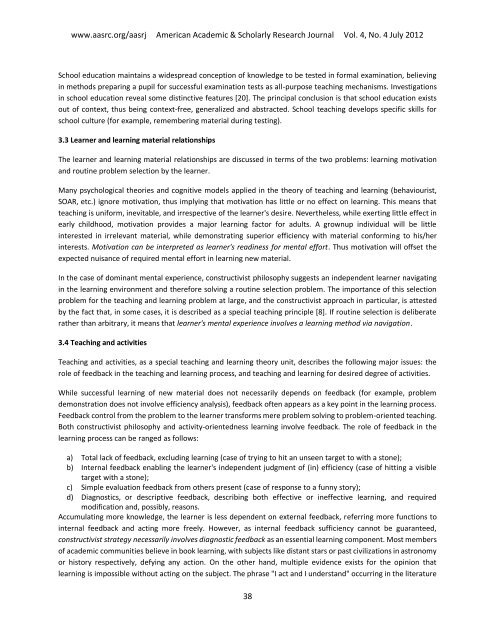E - American Academic & Scholarly Research Center
E - American Academic & Scholarly Research Center
E - American Academic & Scholarly Research Center
Create successful ePaper yourself
Turn your PDF publications into a flip-book with our unique Google optimized e-Paper software.
www.aasrc.org/aasrj <strong>American</strong> <strong>Academic</strong> & <strong>Scholarly</strong> <strong>Research</strong> Journal Vol. 4, No. 4 July 2012<br />
School education maintains a widespread conception of knowledge to be tested in formal examination, believing<br />
in methods preparing a pupil for successful examination tests as all-purpose teaching mechanisms. Investigations<br />
in school education reveal some distinctive features [20]. The principal conclusion is that school education exists<br />
out of context, thus being context-free, generalized and abstracted. School teaching develops specific skills for<br />
school culture (for example, remembering material during testing).<br />
3.3 Learner and learning material relationships<br />
The learner and learning material relationships are discussed in terms of the two problems: learning motivation<br />
and routine problem selection by the learner.<br />
Many psychological theories and cognitive models applied in the theory of teaching and learning (behaviourist,<br />
SOAR, etc.) ignore motivation, thus implying that motivation has little or no effect on learning. This means that<br />
teaching is uniform, inevitable, and irrespective of the learner's desire. Nevertheless, while exerting little effect in<br />
early childhood, motivation provides a major learning factor for adults. A grownup individual will be little<br />
interested in irrelevant material, while demonstrating superior efficiency with material conforming to his/her<br />
interests. Motivation can be interpreted as learner's readiness for mental effort. Thus motivation will offset the<br />
expected nuisance of required mental effort in learning new material.<br />
In the case of dominant mental experience, constructivist philosophy suggests an independent learner navigating<br />
in the learning environment and therefore solving a routine selection problem. The importance of this selection<br />
problem for the teaching and learning problem at large, and the constructivist approach in particular, is attested<br />
by the fact that, in some cases, it is described as a special teaching principle [8]. If routine selection is deliberate<br />
rather than arbitrary, it means that learner's mental experience involves a learning method via navigation.<br />
3.4 Teaching and activities<br />
Teaching and activities, as a special teaching and learning theory unit, describes the following major issues: the<br />
role of feedback in the teaching and learning process, and teaching and learning for desired degree of activities.<br />
While successful learning of new material does not necessarily depends on feedback (for example, problem<br />
demonstration does not involve efficiency analysis), feedback often appears as a key point in the learning process.<br />
Feedback control from the problem to the learner transforms mere problem solving to problem-oriented teaching.<br />
Both constructivist philosophy and activity-orientedness learning involve feedback. The role of feedback in the<br />
learning process can be ranged as follows:<br />
a) Total lack of feedback, excluding learning (case of trying to hit an unseen target to with a stone);<br />
b) Internal feedback enabling the learner's independent judgment of (in) efficiency (case of hitting a visible<br />
target with a stone);<br />
c) Simple evaluation feedback from others present (case of response to a funny story);<br />
d) Diagnostics, or descriptive feedback, describing both effective or ineffective learning, and required<br />
modification and, possibly, reasons.<br />
Accumulating more knowledge, the learner is less dependent on external feedback, referring more functions to<br />
internal feedback and acting more freely. However, as internal feedback sufficiency cannot be guaranteed,<br />
constructivist strategy necessarily involves diagnostic feedback as an essential learning component. Most members<br />
of academic communities believe in book learning, with subjects like distant stars or past civilizations in astronomy<br />
or history respectively, defying any action. On the other hand, multiple evidence exists for the opinion that<br />
learning is impossible without acting on the subject. The phrase "I act and I understand" occurring in the literature<br />
38


